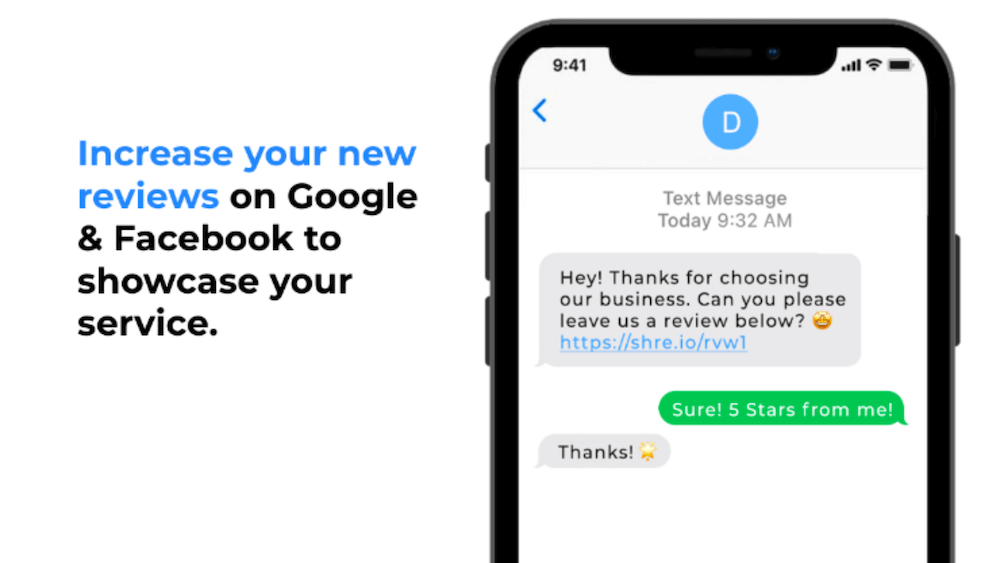Healthcare Reputation Management - Importance, Tips, and Best Practices

You strive to provide the best care possible for your patients. But you find yourself in a difficult situation where your online reputation is not reflecting the quality of care you provide.
Negative reviews are sneaking in, and your phone isn’t ringing as much as it used to. Your schedule looks empty, and you’re wondering, “What went wrong?”
The truth is you have neglected your online healthcare reputation up until now. But don’t worry; improving your online reputation is always an option.
It’s time to take control of your healthcare reputation management.
By taking proactive steps to address the negative reviews and manage your online presence, you can begin to turn things around.
Remember that a healthy mix of positive and few negative reviews is good and, in fact, realistic. Address any concerns in negative reviews and enhance the quality of care to improve patient satisfaction.
Don’t let some negative reviews hold you back. Take control of your online reputation and show potential patients why you are the right healthcare professional for them.
What is Healthcare Reputation Management?
Healthcare reputation management is understanding how the world sees you. It monitors your online presence and controls how patients your practice.
It’s the shield that protects your reputation. It’s the tool that helps you spread the word about your amazing work and attract new patients to your practice.
It’s not just about managing negative reviews but also about highlighting the positive aspects of your practice. It’s about promoting your expertise, credentials, and your patient-centric approach.
Effective healthcare reputation management involves consistently gathering and monitoring patient feedback on various review platforms, such as Google, Yelp, and Healthgrades.
Also, it includes responding quickly to negative reviews while acknowledging positive feedback, allowing you to maintain and improve your reputation.
Healthcare reputation management ensures that your online presence accurately reflects the quality of care you provide. It’s your secret weapon to help you reach new heights in your career and make a difference in the lives of more people.
Why Online Reputation Management is Important for Healthcare and Medical Practices?
Online reputation management for doctors can take their practice from good to great. It helps them attract new patients, build trust and grow their practice.
Let’s face it; patients turn to the internet to research and find healthcare providers. They read reviews, check ratings, and browse websites before deciding.
According to a survey, 70% of patients use online reviews to evaluate healthcare providers.
Likewise, patients reported that healthcare provider reviews matter, with 40% not wanting to visit a provider with poor reviews.
As for the average star rating for healthcare practices, 44% of patients prefer at least a 4-star rating, 23% favor 4.5 stars, and 8% accept five stars. This data shows that many patients view an average star rating of 4 or higher as important when choosing a healthcare provider.
When choosing a new healthcare provider, patients take into consideration various factors. These factors include the number of reviews, referrals from family and friends, and the provider’s speciality expertise.
In particular, 65% of patients under 60 reads 10+ reviews before making a medical decision. To establish a positive online reputation, healthcare providers or medical practices should aim to have at least ten positive reviews.
It’s noteworthy that among all the factors, referrals from family and friends hold the most weight (23%), followed by the provider’s speciality expertise (18%) and online reviews (16%).
So, if your online presence is not up to par, it can be a deal-breaker for potential patients. A bad online reputation can make it difficult for patients to find you, trust you and ultimately choose you over your competitors.
Healthcare reputation management helps you stand out in a crowded market and reach new heights in your career. It’s the key to unlocking the full potential of your practice.
A good reputation can profoundly impact a healthcare professional’s or medical practice’s ability to earn patient trust and confidence.
A positive reputation can attract new patients, boost retention rates, and promote positive word-of-mouth recommendations. On the other hand, a negative reputation can deter potential patients and negatively impact a practice’s ability to grow and succeed.
Moreover, a healthcare provider’s reputation can affect their ability to collaborate with other healthcare professionals, medical facilities, and insurance companies. This can impact their ability to provide the best possible care for their patients.
Benefits of Reputation Management
There are many benefits of online reputation management for doctors:
- Helps to identify areas of improvement: Reputation management allows healthcare providers to monitor online reviews, ratings, and comments, helping them to identify areas of improvement.
- Boost patient satisfaction and trust: Online reputation management for doctors can boost patient satisfaction, trust, and loyalty by handling negative feedback proactively and improving patient experience.
- Attracts new patients: Healthcare providers with a good online reputation can attract new patients consistently.
- Improves patient retention: By maintaining a positive image and reputation, healthcare professionals can retain existing patients and improve their practice.
- Enhances credibility: Hospital reputation management can also help improve a healthcare facility’s credibility among other care providers and the general public.
- Helps to build trust with other industry professionals: Good online reputation management can help build trust with other healthcare providers, enabling networking, partnerships, and collaborations.
- Promote the practice’s overall growth: Healthcare reputation management can contribute to the growth and success of a healthcare facility by promoting its positive image.
8 Best Practices For Medical Professionals For Effective Healthcare Reputation Management
- Claim your profile on popular Healthcare Review sites
- Monitor online reviews and ratings
- Claim your GMB profile to boost visibility
- Respond to negative reviews
- Use Social Media for Your Healthcare Reputation Management
- Encourage positive reviews
- Build a strong website
- Adopt a Healthcare Reputation Management Platform
1. Claim your profile on popular Healthcare Review sites
Make sure your practice is listed on all major healthcare review websites.
Some popular review sites are:
- Doctor.com
- Yelp
- Healthgrades
- RateMDs
- CareDash
You must update your information to ensure it is accurate and current.
2. Monitor Online Reviews and Ratings
Once you have claimed your profiles on these review sites, it’s time to monitor them. Keep an eye on these sites for reviews and respond to them promptly.
Encourage your happy patients to leave feedback on these review sites to get more positive reviews.
A study conducted by Harvard Business School found that a 1-star increase on Yelp could lead to a 5-9% increase in revenue. This illustrates the significance of listing your practice on medical review sites.
3. Claim your Google Business Profile to boost visibility
Google Business Profile (formally known as the Google My Business profile) listing is crucial for creating a strong online presence. It allows patients to easily find your practice on Google Maps and Search, leading to increased foot traffic and potential new patients.
If you want your GMB profile to stand out in search results, ensure it’s accurate and complete.

Here are some tips for optimizing your GBP profile:
- Select the appropriate category for your practice, for example, “Sports Physiotherapy”, or “Post Operative Physiotherapy” for a physiotherapy practice.
- Provide your business name, address, and phone number (NAP), and ensure they are consistent with your website and other online listings.
- Write a description of your business that includes relevant medical keywords.
- Include high-quality visuals of your office, staff, and equipment.
- Ask patients to leave reviews on your GBP listing to increase visibility and credibility.
4. Respond to Negative Reviews
Medical professionals must actively monitor and respond to reviews promptly and professionally.
Especially responding to negative feedback demonstrates a commitment to patient satisfaction. Taking action shows you care about your patients’ concerns and want to improve their experience.
45% of patients are more likely to visit a business that takes the time to respond to their negative reviews. You can still build a rapport and turn them into satisfied patients despite being unable to change the situation that led to the negative review.
When responding to a negative patient review, it’s important to follow these steps:
- Acknowledge the patient’s experience and express your regret for any dissatisfaction they may have encountered.
- Invite the patient to reach out to you directly to discuss their concerns further.
- Respond to the patient on time to show that you take their feedback seriously.
- Try to understand the root cause of the issue and devise a solution that addresses the patient’s concern.
- Apologize for the bad experience and offer a sincere, heartfelt apology.
- Address the concern and offer a solution, if possible.
- Show empathy and understanding, and do your best to turn the situation around.
- Thank the patient for their feedback, and let them know that you value their input and are committed to improving the patient experience.
Remember that a prompt and professional response can help mitigate damage to your reputation and build patient trust. Additionally, addressing negative reviews can provide valuable insights into areas where the practice can improve.

If a patient gives you a positive review, thank them for their words and tell them, you value their opinions.
Seven out of ten customers change their opinions about a business when it responds to reviews.
When responding to a positive patient review, you must:
- Thank the patient for leaving a review and choosing your practice.
- Acknowledge the specific aspects of their experience that they enjoyed or appreciated.
- Show gratitude and express how happy you are to hear they had a positive experience.
- Use the opportunity to build a relationship with the patient and encourage them to return.
- Share the review on your social media pages or website to showcase positive feedback and build trust with potential patients.
- Respond promptly to show that you value their feedback and appreciate their patronage.

5. Use Social Media For Your Healthcare Reputation Management
Social media is powerful in building your online reputation. According to Mediabistro, 40% of patients say they use the information they find on social media to make healthcare decisions.
Also, 71% of patients would recommend the practice to others if a business quickly responds to complaints through social media.
These facts show how critical it is to add social media to your healthcare marketing plan.

To make the most of it, implement the following healthcare social media strategies:
- Develop a consistent online presence. Create social media profiles on Facebook, Instagram, and Twitter, ans update them regularly.
- Share informative and educational content highlighting your practice’s services and expertise. This can include blog posts, infographics, videos, and patient testimonials.
- Encourage patients to leave reviews on platforms such as Google, Healthgrades, and Yelp. Respond to reviews in a timely and professional manner.
- Use social media advertising to reach a larger audience and drive traffic to the practice’s website.
- Engage with followers by participating in relevant online discussions, hosting live Q&A sessions, and promptly responding to questions and comments.
- Build relationships with other healthcare providers in the community and collaborate on social media campaigns.
- Continuously evaluate and adjust your social media strategy based on engagement and performance metrics.
By implementing these strategies, healthcare providers can build their online reputation, attract new patients, and ultimately grow their practice.
6. Encourage Positive Reviews
Encourage your happy patients to leave positive reviews on online sites. This will help to counteract any negative reviews and improve their overall reputation.
Positive reviews can significantly impact a practice’s reputation and attract new patients. They showcase a provider’s expertise, patient satisfaction, and quality of care.
Here are a few ways healthcare providers can encourage positive reviews:
- Provide excellent care: The best way to get positive reviews is by providing excellent care to patients. This will naturally lead to satisfied patients who are more likely to leave positive reviews.
- Ask for reviews: At the end of an appointment or after a procedure, you should ask patients to leave a review on your website or review platforms such as Google, social media, or Yelp.
- Make it easy: Send patients direct links to review sites through text messages. You can also give them a card or brochure with relevant links, QR codes, and instructions.
- Incentivize: Offer a small incentive, such as a discount or a free service, for patients who leave a review. Remember, asking for only positive reviews is against most review site policies, so you can only ask for reviews, not exclusively positive ones.

7. Build a Strong Website
Your website is the first point of interaction for patients. Patients judge practices based on the look and performance of the website.
90% of visitors evaluate a business by its website design.

To get more patients to book appointments, you want them to stay on your website, engage with it and interact with it. Then, design and structure your website by keeping your patients in mind.
Your medical website must have the following:
- An attractive home page that accurately reflects your brand
- Responsive design to ensure optimal viewing on all types of devices
- Clear and concise calls-to-action (CTAs)
- Authoritative and influential healthcare SEO content
- High-quality visuals of the healthcare facility, staff, and clinic environment
- Simple and easy online appointment software
- Social proof, like positive patient feedback, testimonials, and reviews
- Robust web chat so patients can easily communicate.
8. Adopt a Healthcare Reputation Management Platform
A reputation management platform can automate your medical practice’s marketing, patient communication, online payments, and appointment booking.
By streamlining all these tasks into one system, you can simplify the process of running a successful clinic.
DemandHub is a reputation management software that can manage your online reputation, boost positive reviews, and optimize the patient experience.

It helps practice attract new patients by incorporating state-of-the-art customer experience tools into your healthcare websites. For example, Text Messages, Web Chat, Online Scheduling, Contactless Payments Processing, and much more.
With DemandHub’s modern messaging capabilities, you can start a two-way conversation with your patients. Send text messages with review links directly to patients, enabling them to post a review in less than 30 seconds.
Book a free demo today if you’re looking for an easy and effective way to improve your healthcare reputation management tenfold.
Frequently Asked Questions (FAQs) about Healthcare Reputation Management
How does reputation management work in healthcare?
Reputation management in healthcare works by monitoring and influencing how a healthcare facility or provider is perceived by patients and the public. This involves tracking online reviews and social media comments, responding to feedback, managing negative reviews, and promoting positive patient experiences.
Why is reputation management crucial in healthcare?
Reputation management is crucial in healthcare as it builds trust with patients, protects the facility or provider’s brand image, and can directly impact patient retention and acquisition. A positive reputation can attract new patients and increase referrals, while a negative one can deter potential patients.
How can healthcare providers manage their online reputation?
Healthcare providers can manage their online reputation by actively seeking patient feedback, promptly responding to online reviews, addressing patient concerns, and using social media and other online platforms to highlight positive experiences and interactions.
What is healthcare online reputation management?
Healthcare online reputation management is the practice of monitoring, managing, and influencing the digital image of a healthcare provider or organization. It involves monitoring online reviews and social media comments, addressing negative feedback constructively, and promoting positive patient reviews.
What are the four tips to manage online reputation easily?
Here are four tips to manage online reputation:
- Regularly Monitor Online Activity: Stay aware of what patients are saying about you online by regularly reviewing your social media accounts, online review sites, and patient feedback surveys.
- Respond Promptly: Whether the feedback is positive or negative, always respond quickly. This shows that you value patient feedback and are dedicated to improving patient care.
- Encourage Positive Reviews: Ask your happy patients to share their experiences online. This can help balance out any negative reviews and provide an accurate picture of your practice.
- Address Negative Reviews Professionally: Instead of ignoring or arguing with negative reviews, address them publicly but professionally. Apologize for any inconvenience and state the steps you’ll take to resolve the issue.
What are the best techniques used in healthcare online reputation management?
The best techniques used in healthcare online reputation management include:
- Proactive Reputation Building: Actively encourage patients to leave reviews or testimonials about their positive experiences.
- Regular Monitoring: Regularly monitor all online platforms where patients may leave reviews or feedback, such as Google, Yelp, and Healthgrades.
- Quick Response: Quickly and professionally respond to all reviews, both positive and negative, to demonstrate that you value patient feedback.
- Transparent Communication: Be transparent and honest in your responses, particularly when addressing negative feedback. Outline steps you are taking to rectify the situation, which can show commitment to improving patient care.
- Utilize SEO: Use search engine optimization to ensure positive information about your practice appears in online search results. This may include regularly publishing positive, high-quality content on your website or blog.




